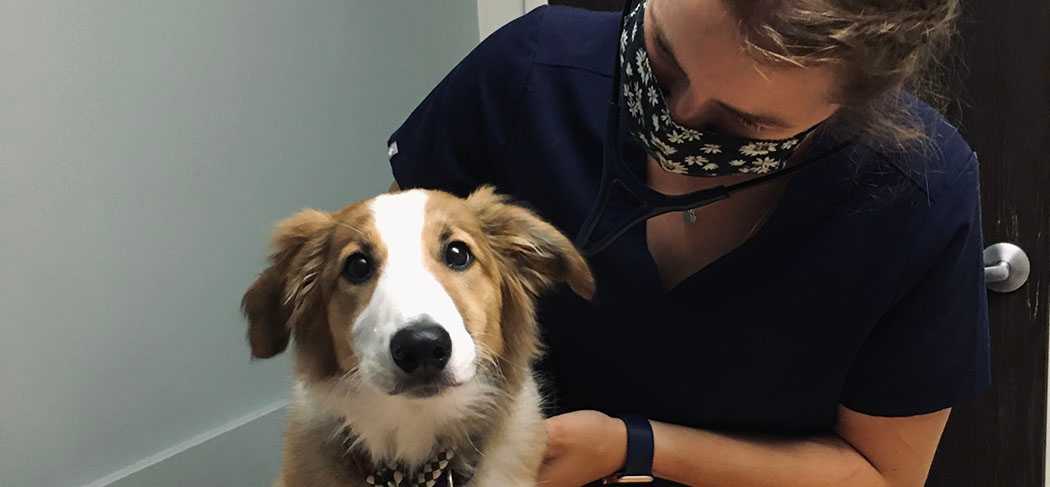
All About Heartworm: DVM Externship Blog Series, Part 2
August 09, 2022
Part 2 of a 3-part blog series following a student veterinarian through her eight-week externship gaining hands-on experience in a mixed veterinary practice. Read Part 1 - Living the James Herriot Lifestyle.
Final year Ontario Veterinary College student veterinarians begin their clinical year with an eight-week externship where they have an opportunity to practice their skills in a real world setting as part of a veterinary team providing animal care to the public. Dr. Morganna Turner, OVC DVM 2022, completed her externship in the summer of 2021 at the Paris Veterinary Clinic in Paris, Ontario. Learn more in the intro post Hands-On Training Enhances Student Veterinarians' Skills.

Have you ever heard of heartworm? If you own a dog and live in many areas of Ontario or anywhere in the United States, chances are you have, and your veterinarian has likely recommended preventative medication so that your pet does not become infected with this nasty parasite!
Heartworm is a parasite that is infectious to dogs and cats and is transmitted between animals by mosquitoes. Immature heartworm larvae called microfilariae are released by adult heartworms into the bloodstream of an infected animal, and when a mosquito bites that animal, the microfilariae enter the mosquito. The microfilariae develop into heartworm larvae within the mosquito, and then when the mosquito bites another animal, the larvae enter the bloodstream of that animal and can develop into mature heartworms over the course of six to seven months. In southern Ontario, the heartworm transmission season is essentially the spring, summer, and fall, when the temperatures are high enough for mosquitoes to survive. If an animal is on heartworm preventative medication the medication should be given throughout this whole transmission season, essentially June to November, and it is also often recommended that animals be tested for heartworm prior to the first dose of medication.
One day in late May while on my externship, myself and a veterinarian completed a house call for some heartworm tests on several outdoor dogs. When we test for heartworm in veterinary clinics, we use a blood test that can detect a substance released only by mature female heartworms. Given the time it takes for heartworms to reach maturity), we are essentially testing to see if the animal was infected the previous year. Three of the tests we did that day came back positive for heartworm. Coming with lots of downtown Toronto small animal experience, where we see high rates of preventative medication administration and a low prevalence of infection, I had actually never seen a heartworm positive dog before! However, in the region of Ontario where Paris Veterinary Clinic is, heartworm is much more common. By the first week of my externship, I had not only seen several heartworm positive dogs, but even become familiar with the treatment protocol. The protocol lasts 91 days and involves specific timed and repeated administration of several medications, including antibiotics for the bacteria Woolbachia that is carried inside microfilariae, drugs that kill the microfilariae, steroids to decrease inflammation caused by dying heartworms, and of course a drug to kill the mature heartworms.
The treatment plan for these heartworm positive dogs was therefore clear, once the owners consented to treatment and to comply with the exercise restriction that is required for months due to the large dying adult heartworms present in the animal’s bloodstream. However, one of the dogs that tested positive that day was also pregnant! The vet turned to me and asked how the treatment plan was going to change with the additional factor of pregnancy. What could we do for her now, versus after she had delivered her babies? What would we do for the puppies? I was not sure of the answers to these questions, as the whole procedure of treating heartworm was very new to me, so I did some research. It turns out that because of the critical role of mosquitoes in heartworm development, there was no chance the puppies could be infected from their mother and should just be started on a heartworm preventative medication as soon as they were old enough. And as for the mother, it wouldn’t be safe for her to start heartworm treatment while she was still pregnant, and she wasn’t showing any symptoms of infection, so she would be okay to wait a few weeks for treatment. Once the puppies were born, she could undergo the standard treatment protocol.
As a result of seeing all these heartworm positive dogs and realizing how extensive (both medically and economically) the treatment protocol is, I can really appreciate the importance of using preventative medication if a pet lives in an area endemic for heartworm. We are so lucky to be able to have very safe ways to prevent this serious parasite from being able to cause disease in our pets, and with many of the available preventative options also functioning as general dewormers, there are lots of good reasons to use them!
Reference: “Heartworm in Dogs.” Companion Animal Parasite Council Guidelines, Companion Animal Parasite Council, 23 Oct. 2020, capcvet.org/guidelines/heartworm/.
Find blogs from previous student veterinarians at the OVC Externship Blog Project.
.png)